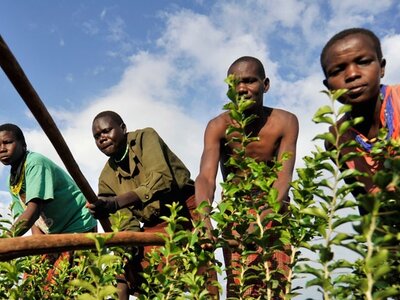Resilience programming
- 20 percent
- increase in the risk of hunger and malnutrition is expected by 2050 if people's climate resilience is not improved
- 40,000 households
- in Ethiopia, Senegal, Malawi and Zambia are reached through the R4 Rural Resilience Initiative
- 80 percent
- of the world's food insecure live in countries prone to natural shocks, where land and ecosystems are degraded
International humanitarian and development organizations have embraced resilience as an overarching theme. This means that programming for resilience is a multi-actor pursuit; it also means that enhancing resilience may indirectly enhance a range of other capacities.
For these reasons, the aim must be to involve as many stakeholders as possible, in as many sectors as possible, and to ensure that the approach is informed by shared experience. The World Food Programme (WFP)’s reach and convening power compel it to act as a system player, shaping the way actors interact and interrelate.
Our regular partners in resilience-programming include Oxfam, UNDP, UNHCR, UNICEF and the World Bank. Above all, we collaborate closely with our sister UN food agencies in Rome, FAO and IFAD. Together, we have developed a conceptual framework aimed at strengthening resilience for food security and nutrition, setting the stage for greater collaboration as vulnerabilities and risks deepen and multiply.
In particular, the framework guides our efforts to:
- support governments as they roll out social transfers and productive safety nets;
- act with our partners to restore a depleted asset base, through natural resource rehabilitation, and productive and financial capacities;
- and promote innovation, by working closely with the private sector and academic and research institutions.
Central to our efforts is the so-called three-pronged approach (3PA), a consultative process that includes government, multi-sectorial partners and communities. Its tools are converging analyses, consultations and consensus building. The approach relies on:
- integrated context analysis – the mapping of national historical trends in food security and nutrition, shocks, and exposure to risks;
- seasonal livelihood programming -- a participatory process of coordination and partnership under local government leadership;
- and community-based participatory planning – a community-level exercise that identifies needs, adapts responses to contexts, and promotes local ownership of the programme.







